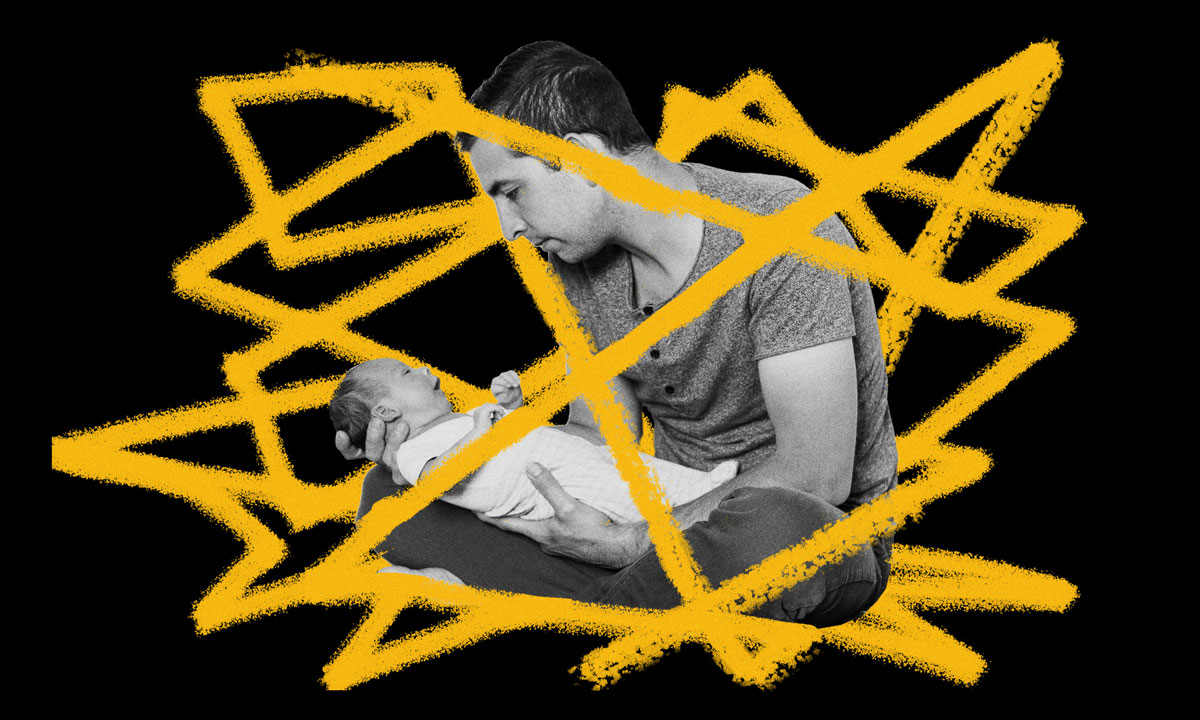How Dads’ Stress and Mental Health Can Influence Their Children’s Development
A meta-analysis of research studies affirms that mental distress in dads before and after the birth of a baby can affect child development.

Join our zero2eight Substack community for more discussion about the latest news in early care and education. Sign up now.
The transition to parenthood can be an anxious time for expectant moms and dads. A recent study shows that stress on fathers before and after the birth of a baby could affect their children’s development.
The study, published in the Journal of the American Medical Association (JAMA) Pediatrics in June, involved a meta-analysis of 84 studies and found that paternal mental distress around the time of birth was associated with poorer global, social-emotional, cognitive, language and physical development in their children.
While research on the intersection of mental health and parenthood has long focused on mothers, this analysis sought to examine whether the mental health of fathers influences child development, said Delyse Hutchinson, an associate professor in the school of psychology at Deakin University in Victoria, Australia and the study’s senior author.
The results didn’t surprise Hutchinson, she said. “It’s still a stigma for a lot of dads, mental health, and they tend not to talk about it openly and that kind of leads maybe to a lot of men not even necessarily recognizing that they’re experiencing mental health symptoms.”
“It matters for families. It matters for supporting mums and babies. So it’s not a surprise. It’s just the affirmation and having the evidence to take to policy makers, healthcare, and say, look, this does matter. We’re gonna do more about this,” she added.
The studies included in the analysis followed the development of children ages 0 to 18, though the majority of research examined development before adolescence. Hutchinson emphasized that the postpartum period, when fathers typically have more direct contact with their baby, has the greatest impact on a child’s development.
Part of the study’s goal was to build awareness around what depression looks like for dads, since they often exhibit different symptoms than women. Men might withdraw socially or feel unable to emotionally regulate themselves. They could also erupt in outbursts or anger, Hutchinson said.
While conducting the analysis, researchers found that a father’s mental state affects children in a number of ways, most notably a child’s social-emotional development, including emotional regulation and social skills. Children who grow up in a household with a father navigating mental health issues such as depression, may themselves have difficulty regulating their emotions, Hutchinson said.
“Say you’re feeling a little bit sad and down, you tend to be less sensitive towards others, or if you’re getting agitated and frustrated … that’s a less sensitive response to an infant or a young child,” Hutchinson added.
Children pick up on emotional cues. When a child experiences their father expressing anger or distress, it can lead them to develop an insecure bond with him, according to Hutchinson. This can bring a child to feel unsure that their dad can provide for their emotional needs.
Most of the existing research on how a parent’s mental health influences child development focuses either on both parents or just the mother, Hutchinson explained. That means moms and dads are grouped together when researchers look at development outcomes for children. While conducting the meta-analysis, lead researcher Genevieve Le Bas reached out to many authors of the published studies to ask if they could retrieve unpublished data on the mental health of fathers.
“Whilst a very significant proportion of the data in this review is from published studies, we often had to contact authors to obtain data on fathers that wasn’t specifically recorded in those studies,” said Hutchinson.
The fact that fathers were either initially left out or mixed into data about mothers is reflective of larger issues in the research field, as well as the culture of parenting, Hutchinson explained. That culture tends to push fathers to the side and neglect health services which could support them throughout parenthood.
But the role of fathers in parenting and the awareness around their mental health is changing. Dr. Craig Garfield, a professor of pediatrics at Northwestern University and a practicing pediatrician at Lurie Children’s Hospital in Chicago, has experienced that change firsthand as both a father and a researcher. When Garfield took a year off to take care of his 18-month-old son, he felt very lonely. He recalled being the sole father on the playground and in the local “mom and tot” classes. Soon after, he shifted his research focus from injury prevention in childhood to the role of fathers in families.
Medical journal reviewers have long been skeptical that fathers can experience post-natal depression, Garfield said. When he worked on a report with his colleagues in 2002 about how pediatricians can support fathers and recommended screening fathers for depression after their partner gave birth, he got pushback during the peer review process.
“It came back from the reviewer saying, ‘There’s no such thing as this. You can’t kind of make it up and start suggesting screening dads,’” he said. “And to a certain extent, that is true. There was not much in the literature, but we all knew from clinical experience that there were dads that were depressed.”It wasn’t until about 10 years ago that Garfield was able to include peer-reviewed studies on paternal mental health in his published research papers, he said.
There are cultural norms and stereotypes working against dads, Garfield said, but it’s necessary to recognize that paternal mental health affects families every day — and to address the issue.
Addressing Mental Health for Fathers
There are a number of efforts underway to address some of the findings surfaced by the emerging body of research on fathers’ mental health. Kevin Seldon, who runs Dads Supporting Dads, a network of organizations supporting fathers under the nonprofit All Parents Welcome, said the dads he works with are often met with skepticism when they express their struggles with postpartum depression. Seldon and his wife spent years trying to have a baby. During the birth of their son, his wife needed an oxygen mask and their baby emerged blue. (Seldon’s wife and now 6-year-old son are healthy.)
“It’s very stressful and anytime I tried to address it, people would be like, ‘You didn’t give birth.’ But trauma is not mutually exclusive,” Seldon said.“[After] five years of struggling and the very traumatic birth — by the time we got home, I didn’t recognize myself in the mirror.”
Dads Supporting Dads grew out of a podcast Seldon launched when he found himself feeling isolated after the birth of his son. Through his show Dad I’d Like to Friend, Seldon and other fathers were able to talk about their feelings after the birth of their children.
“My wife had all these moms groups, right? But I couldn’t find any support,” Seldon said. “I realized that I was so far from alone, so many people were struggling.” He also sought help through talk therapy, which helped him understand that his depression wasn’t uncommon, that what he experienced wasn’t a depressive episode, and that his emotions wouldn’’t necessarily disappear a few years after birth.
As the podcast took off and Seldon saw demand for that connection, he started facilitating in-person gatherings for local dads and a WhatsApp community where dads could connect across the country.
As nonprofit organizations and community groups look to connect fathers, researchers are urging policymakers to enact more expansive paid leave and physical and mental health screenings for fathers. Though society has traditionally pushed dads to return to work as quickly as possible to get a paycheck, Garfield believes paternity leave could help fathers better support their children.
“I took care of a family in the NICU this weekend where the baby was two days old in the NICU and dad’s back at work,” Garfield said. “One of the most important things that we can do is really work toward paid leave for moms and for dads.”
Get stories like these delivered straight to your inbox. Sign up for The 74 Newsletter


;)
